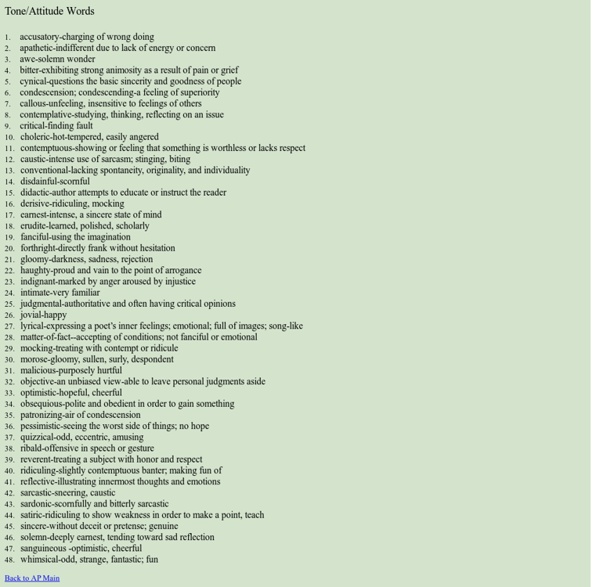How Much Is It: A Shopping Lesson Plan
by Chris Gunn Time: Up to 4 hours depending on how much the teacher wishes to use. Materials: To give to the students. Introductory Vocabulary Exercises. Information Gap
List of forms of word play
This is a list of techniques used in word play with Wikipedia articles. Techniques that involve the phonetic values of words Mondegreen: a mishearing (usually unintentional) ase as a homophone or near-homophone that has as a result acquired a new meaning. The term is often used to refer specifically to mishearings of song lyrics (cf. soramimi).Onomatopoeia: a word or a grouping of words that imitates the sound it is describingRhyme: a repetition of identical or similar sounds in two or more different words Alliteration: matching consonants sounds at the beginning of wordsAssonance: matching vowel soundsConsonance: matching consonant soundsHolorime: a rhyme that encompasses an entire line or phraseSpoonerism: a switch of two sounds in two different words (cf. sananmuunnos)Janusism: the use of phonetics to create a humorous word (e.g. GAYsha from Geisha)) Techniques that involve semantics and the choosing of words
18 Common Words That You Should Replace in Your Writing
It’s a familiar scene: you’re slumped over your keyboard or notebook, obsessing over your character. While we tend to agonize over everything from structure to backstory, it’s important to weigh how you write something too. A perfectly constructed world is flat on the page if you use feeble, common words. When you’re finished constructing your perfectly balanced world, do your writing a favor and take another pass to weed out these 18 haggard words.
Why consecutive learning is important?
“Although I’m retired from the Commission now I still do a bit of training now and again and I sometimes get asked why students of conference interpreting on university interpretation courses spend so much of their time learning how to do consecutive interpreting when practically all the work they’ll do later as a conference interpreter- assuming they get that far- will consist of simultaneous interpreting..the difference as I’m sure most of you know being that consecutive (as the name suggests) is done after the speech, using among other things your memory and the notes you have taken during the speech to be interpreted whereas simultaneous is done in a soundproofed booth wearing head-phones while the speaker is talking..which is probably how most laymen see interpreters and also how most professional interpreters might see themselves. Should students learn CONS before SIM? Dick Fleming is a former staff conference interpreter and trainer at the European Commission, Brussels. Like this:
Gestures and Body Language
Hey there! Lots of writers liked my list of facial expressions, so I thought I would do a companion post about gestures and body language. Describing these can help readers visualize a scene and get a feel for the characters, and again, they can set up lines of dialogue so you don’t have a string of he said, she said, he asked, she exclaimed, etc., running down the page. You might want to consider which gestures or what body language is typical for each of your characters. For instance, one of my characters in the novel I just finished tends to hug herself when she’s nervous, while another has a habit of rubbing at his shoulder when he’s uncomfortable.
Linking Words — A complete List of English Connecting Words
Linking & Connecting Words It is essential to understand how Linking Words, as a part of speech, can be used to combine ideas in writing - and thus ensure that ideas within sentences and paragraphs are elegantly connected - for the benefit of the reader. This will help to improve your writing (e.g. essay, comment, summary (scientific) review, (research) paper, letter, abstract, report, thesis, etc.). It is also fundamental to be aware of the sometimes subtle meaning of these "small" words within the English language. "Linking Words" is used as a term to denote a class of English words which are employed to link or connect parts of speech or even whole sentences. They are also called connecting words.
100 Exquisite Adjectives
By Mark Nichol Adjectives — descriptive words that modify nouns — often come under fire for their cluttering quality, but often it’s quality, not quantity, that is the issue. Plenty of tired adjectives are available to spoil a good sentence, but when you find just the right word for the job, enrichment ensues. Practice precision when you select words.
Synonyms for words commonly used in student's writing
Amazing- incredible, unbelievable, improbable, fabulous, wonderful, fantastic, astonishing, astounding, extraordinary Anger- enrage, infuriate, arouse, nettle, exasperate, inflame, madden Angry- mad, furious, enraged, excited, wrathful, indignant, exasperated, aroused, inflamed Answer- reply, respond, retort, acknowledge Ask- question, inquire of, seek information from, put a question to, demand, request, expect, inquire, query, interrogate, examine, quiz Awful- dreadful, terrible, abominable, bad, poor, unpleasant
Interpreters and Emotional Intelligence
Details Published on Wednesday, 29 October 2014 10:20 Written by Diana Singureanu As Schweda Nicholson rightly observed, scholars, interpreter trainers and practitioners have wondered for many years about the ideal personality traits of a good interpreter (Schweda Nicholson, 2005). Considering the intensity of the effort involved, it is important for interpreters to be able to perform adequately under pressure and to have self-control. More recently the concept of ‘soft skills’ is often quoted in connection with the key skills one needs to become a conference interpreter.



